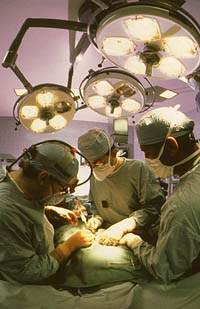The First Cloned Heart-transplant Successful
By: Linda Lau
Last Friday on March 7, millions of people in awe gathered around their
computers watching live on-line as the first cloned heart-transplant was successfully
completed. Due to a weak heart and subject to a heart attack, the 52 year old Harold Kin,
a college professor from Anaheim, California volunteered to test out the relatively new
cloning technology of duplicating organs. As difficult as a regular heart transplant,
doctors say that the surgery went extremely well. Today, he is recuperating in the
infirmary and is in relatively stable condition. With the new heart, Kin needs not worry
about a body rejection of the organ. In fact, people speculate a longer life span for the
middle-aged patient.


The stem-cell cloning was discovered approximately a century ago in
which specific organs and tissues were able to be produced outside of the body. Using
bovine eggs, cells were produced and placed inside humans so that the organ was in fact
eternally young: humans with these organs were in a state of perpetual infancy. Now, after
a century of refining and improving, organ cloning has become a natural plan of action in
the medicine fields.
A century ago, the scientists already believed that stem-cell cloning
was the answer to diseases such as Parkinsons's or any transplant because it would solve
the problem of the body naturally resisting any foreign objects. So whenever a transplant
was conducted, almost every patient needed to be on medication for their rest of their
lives to counter the immune system that tried to reject the organ.
Furthermore, some people who needed transplants then had to wait until
a person died and the family willing to donate their organs. Transplant candidates had to
wait for a donor with the same blood type. Even after this, they might be on a waiting
list with other patients for the same organ. The wait induces both mental and physical
pain in a person plagued with a disease. With this stem-cell cloning in which organs can
be duplicated, all these problems are eliminated.
With the successful implant of the cloned heart, doctors speculate the
people will become increasingly trusting of the technique. Furthermore, since the
government plans to support these cloning projects for the medicinal purposes, the cost of
such a procedure will be small enough for the average worker to afford. Hopefully, it will
take the place of other dangerous operations and save many more lives.